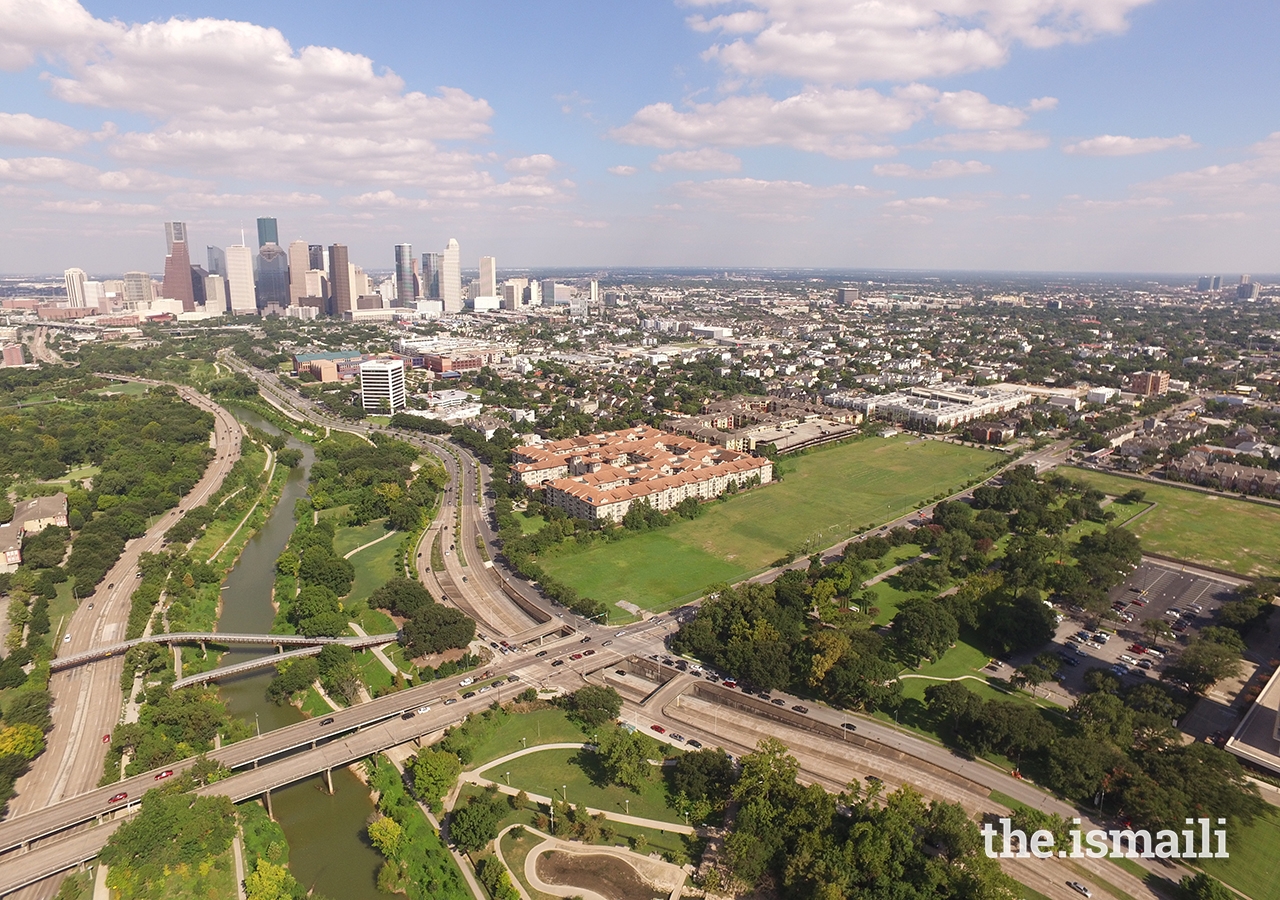The Center’s design team also includes Thomas L. Woltz, of Nelson Byrd Woltz Landscape Architects; Hanif Kara, co-founder of structural engineering firm AKT II and professor in practice, Harvard Graduate School of Design; and Paul Westlake of DLR Group, who leads the firm’s Global Cultural+Performing Arts Studio, as the architect of record.
The selection of architects follows the announcement made by Mawlana Hazar Imam during his Diamond Jubilee visit to the USA in March 2018 to build a high-profile Center in Houston.
The Jamat across the United States expressed gratitude and excitement at the possibilities and aspirations that an Ismaili Center represents for the USA and global Jamat. Ismaili Centers are symbolic markers of the permanent presence and core values of the Ismaili community around the world. The Center in Houston will be the first in the United States, and seventh globally. It will enrich Houston’s diverse community and elevate the city’s architectural landscape.
Houston’s Mayor Sylvester Turner welcomed the announcement. “The Ismaili Center will be a place where Houstonians of all backgrounds, faiths, and walks of life will find engaging, thoughtful, and compassionate programs, and people. That will be in keeping with Ismaili values and the values of the Ismaili leader, the Aga Khan, who last visited Houston in March 2018. It’s fitting that the Center will be designed by a world-renowned architect who has lived, studied and worked around the world, and that the green space will be designed by a landscape architect who has already worked on a major Houston park,” he said. “This is a milestone for our city.”
Ms Moussavi’s previous projects include the acclaimed Museum of Contemporary Art in Cleveland, USA; a three-story flagship store for Victoria Beckham in London, UK; the Yokohama International Cruise Terminal in Japan; London’s Ravensbourne College of Media and Communication; and the Torrevieja Auditorium and Madrid Carabanchel Social Housing Development, in Spain. Moussavi also served as chair of the Aga Khan Award for Architecture Master Jury in 2004 and was a member of the Award’s Steering Committee from 2005-2015.
“The evaluation and selection of these architects was both intense and enlightening. The interest from many world-renowned architects for the opportunity to design an Ismaili Center was a reminder of the global stature that an Ismaili Center, and indeed any project by the Ismaili Imamat, holds in the architectural and built environment community,” remarked Dr. Barkat Fazal, President of the Ismaili Council for the USA.
Moussavi is a graduate of the Harvard Graduate School of Design, where she is now a professor, and has previously taught at Columbia University, Princeton University, and the University of California in Los Angeles.
Commenting on the appointment, Farshid Moussavi stated, “Our team brings a broad perspective for the Ismaili Center, with diverse skills and experience in international practice, scholarly research, multidisciplinary thinking and delivering cultural projects successfully in the United States. I am honored to partner with the Ismaili Muslim community to design the new Ismaili Center in Houston. It will bring Houston’s diverse communities together in a unique space for cultural, educational and social activities.”
Houston is among the most ethnically diverse metropolitan areas in the United States and ranks first in total park acreage among major US cities. Green spaces and the external environment have comprised key elements of Ismaili Centers globally. Renowned landscape architect Thomas L. Woltz, who will design the green space surrounding the new Center, was named the Design Innovator of the Year by the Wall Street Journal Magazine in 2013. His works include the design of Hudson Yards in New York, Memorial Park in Houston, and the Aga Khan Garden in Edmonton, Canada.
Each Ismaili Center serves as an ambassadorial building, reflecting traditional principles of Islamic design, while incorporating contemporary elements from the society in which it is situated. The selected site in Houston will become the seventh such building — the other six are located in London, Vancouver, Lisbon, Dubai, Dushanbe, and Toronto.
As expressed by Mawlana Hazar Imam at the opening of the Ismaili Jamatkhana and Center in the Houston suburb of Sugar Land in 2002, “Since all that we see and do resonates on the faith, the aesthetics of the environments we build and the quality of the interactions that take place within them reverberate on our spiritual lives.” Hazar Imam went on to say “As the leader of a Muslim community, and particularly one that now resides in twenty-five countries on four continents, the physical representation of Islamic values is particularly important to me. It should reflect who we are in terms of our beliefs, our cultural heritage and our relation to the needs and contexts in which we live in today’s world.”
The Ismaili community in the United States began with students arriving in the 1960s and is established today in almost every state, with a large presence in Texas. For a number of years, the USA Jamat has organized educational and cultural events in collaboration with local and state governments, universities, museums, and faith organizations, to develop greater understanding between communities.
Reflecting their centuries-old tradition of service, members of the Jamat, young and old, have worked with cities, schools, and civil society organizations to assist those in need, including during Hurricane Harvey in August 2017, when over 2,500 volunteers quickly gathered to help their affected friends and neighbors in the greater Houston area.
Set against the backdrop of the iconic Tolerance Statues, which were made possible in part through a gift from Mawlana Hazar Imam to the city of Houston, and along the city’s main waterway, the Buffalo Bayou, the 11-acre site serves as an ideal location for the first Ismaili Center in the USA, one that will make a significant contribution to the city of Houston, the state of Texas, and the wider United States.








